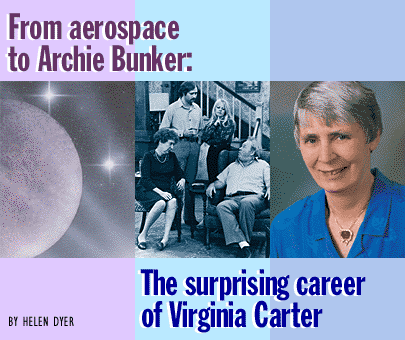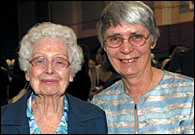The Surprising Career of Virginia Carter
The Surprising Career of Virginia Carter McGill University
User Tools (skip):
The Surprising Career of Virginia Carter

Virginia Carter greets me in the lobby of the Ritz-Carlton Hotel on a June afternoon: discreet, gracious and delighted to be back in Montreal, the city where she spent her undergraduate days. Tomorrow she'll walk across the convocation stage at McGill to receive an honorary Doctorate of Science.
Over tea, soon-to-be-Doctor Carter jokes that news of the honorary degree has helped her discover her true friends. "They're the ones who say, 'What are they giving that to you for?' Those who don't know me very well say things like 'Well deserved!' and 'Jolly good!'" Her burst of laughter disconcerts our waiter who is fiddling with teacups. I smile, wanting to enter into the spirit of the joke, but I know enough about Carter's life to be sure that the recognition from her alma mater is entirely appropriate.
It may be a little limited, however. Often awarded for purely scholarly achievements, this time it recognizes a woman whose scientific training, fervent feminist beliefs and love of a challenge have taken her career through a series of whiplash turns. From high-altitude physics to Hollywood, from precious gems to life-saving soap operas, Carter has enjoyed the tumultuous ride.
 Carter with her
elementary school teacher, Joan Skinner Hanna, BA'35, MEd'72, at spring
convocation. Carter with her
elementary school teacher, Joan Skinner Hanna, BA'35, MEd'72, at spring
convocation.PHOTO: Andrew Dobrowolskyj |
|
|
|
|
A native of Arvida, Quebec, she studied at McGill in the mid-1950s. Although her parents wanted her to go to medical school, Carter developed an aversion to biology classes. "I think it was biology that drove me into physics," she jokes. "I hated it, but I had a natural aptitude for physics, so that's what I did."
Though almost three-quarters of McGill's Science Class of '58 graduates were men, Carter was nonetheless surprised by the difficulty she encountered finding a job. Her degree in math and physics apparently didn't equip her for much more than clerical work, and her Air Force service while at McGill, although one of the "greatest experiences" of her life, would be useful only much later. Watching her male classmates move into the jobs of their choice, with vast opportunities ahead of them, Carter opted for further education. She moved to the west coast of the United States to pursue graduate studies in physics.
With a master's degree from the University of Southern California, Carter secured a job in 1962 with the Douglas Aircraft Corporation. As an "alien," she had no security clearance, however, and it was a year before she was allowed inside the company gates. Tucked away in a trailer, once again on the periphery of the action, she worked on a book about Mars. She smiles now as she tells me that two-thirds of her findings in the book have since been disproved.
After another year at Douglas, Carter went to work for the Aerospace Corporation, a "gathering of top physicists and engineers whose expertise in various areas was needed by pilots." Carter, the only female physicist employed by Aerospace and one of only 300 in the United States, conducted research on high atmospheric conditions and vacuum ultraviolet spectroscopy. While the job provided an opportunity to work with the best of her male counterparts, it was also clear that her chances for promotion were slender, and Carter began to suspect that there was no future for her at the Aerospace Corporation.
The Civil Rights Act of 1964 had outlawed discrimination on the basis of, among other things, race and gender. But many employers flouted the Act, believing that women belonged in the home -- or in a subordinate position to a male boss. Carter looked for a support group and found a fledgling chapter of the National Organization for Women in Los Angeles. A year later, in 1969, Carter became the president of the chapter and the group set about tackling some of the hottest topics of the day: abortion, access to education, child care, and admission for women into male-dominated sports.
She stepped down from the presidency a couple of years later when she was diagnosed with breast cancer -- but her involvement in NOW continued, and in 1973, two significant events occurred: one would affect all women of childbearing age, and the other would spin Carter's career in a surprising new direction.
A landmark court ruling (Roe vs. Wade) gave women in all 50 states the right to abortion on demand. Less public, but no less significant for Carter, was her meeting with Frances Lear, wife of Norman Lear, creator of some of television's most memorable and daring characters. Frances Lear was herself involved in feminist causes, and during a conversation about efforts to help women to find jobs commensurate with their talent, she suggested that Carter should meet her husband.
"I had no idea who he was," Carter laughs, "and I didn't see why I should spend my precious time meeting someone just because his wife thought it would be a good idea."


